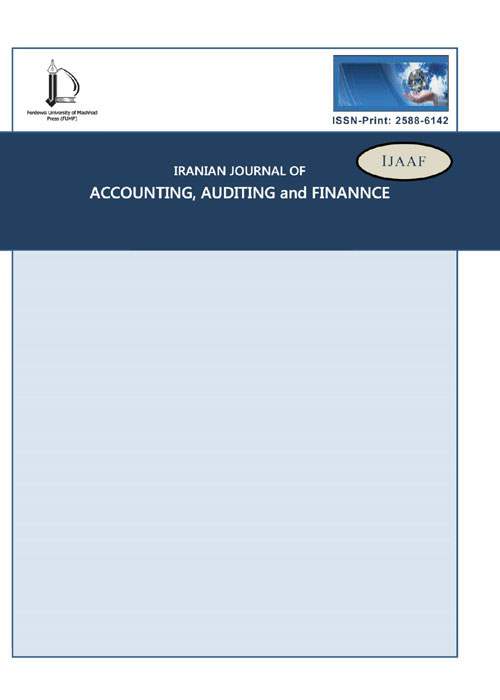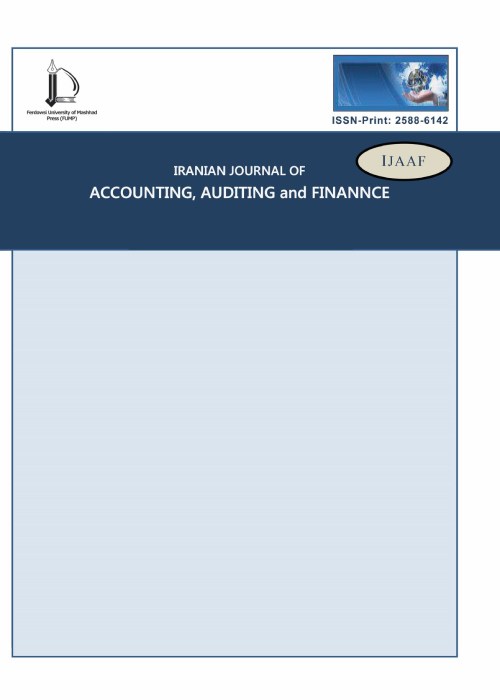فهرست مطالب

Iranian Journal of Accounting, Auditing and Finance
Volume:6 Issue: 3, Summer 2022
- تاریخ انتشار: 1401/05/23
- تعداد عناوین: 7
-
-
Pages 1-13Sustainable growth involves a situation where growth is witnessed with no increase in assets, equity issuance and liabilities. An effective corporate governance mechanism, especially the audit committee, is needed to achieve an optimum sustainable growth rate. The influence of audit committee characteristics on the manufacturing firms’ sustainable growth during the financial crisis cannot be overemphasized. Hence, this study was carried out to investigate the influence of audit committee characteristics on the sustainable growth rate of non-financial firms in Nigeria. The study population was listed as manufacturing companies on the Nigerian Stock Exchange (NSE). A sample size of 60 manufacturing firms was selected using a purposive sampling technique and content analysis, covering ten financial years (2011 to 2020). The results showed that audit committee size, audit committee independence and audit committee financial expertise were positively and significantly associated with sustainable growth rate. The study was anchored on agency theory because it showed that effective audit committee characteristics greatly contributed to the overall companies’ goal congruence. From the foregoing, the study recommended that an audit committee should be large, with a great sense of independence and professionalism to make non-financial companies attain sustainable growth.Keywords: audit committee independence, audit committee meeting, audit committee size, sustainable growth
-
Pages 15-28One of the most critical questions after financial statements is why market responses differ from companies with almost similar statements. This research aims to answer this question by identifying factors affecting the earnings response coefficient. In this research, all of these factors were identified, classified, and ranked for the first time in Iran. The researchers carried out the research using Fuzzy Delphi in two phases, and Shannon's Entropy was done. The cross-sectional method was used, and the data were collected over several weeks. The statistical population included 40 experts who have been active in the Iranian capital market for many years. The results revealed that 46 factors directly influence the earnings response coefficient in Iran. Finally, these factors were classified into five categories: the company’s financial features and financial reporting, the company’s market share, auditing quality, corporate governance, and environmental factors, then ranked with the aid of Shannon’s Entropy.Keywords: Financial reports, Earnings Response Coefficient, Investors’ Behavior, Capital market response
-
Pages 29-53
This study aims to explain the convergence model between the expectations of auditors and users of financial statements with the multidimensional grounded theory and structural equation modeling. The study's statistical population consisted of university faculties, auditing firm partners, tax auditors, official justice experts, financial analysts, senior creditors, and social security insurance auditors. The sampling method of the present study is a mixed purposive approach, which led to 42 in-depth and semi-structured interviews to achieve theoretical saturation. The extant study was implemented in 2020 and 2021. The grounded factors for the expectation convergence provide Provision of a cultural and educational context; Reforming, unity of procedure between upstream laws and regulations; Enhancing audit performance and effectiveness; Continuous monitoring of professional organizations and regulatory bodies on the performance of auditors; Strengthening the computer auditing infrastructure and paying attention to social responsibility and Requiring auditors to be accountable. Furthermore, the convergence between the expectations of auditors and users of financial statements has consequences providing an optimal allocation of resources, data transparency, and crime reduction, Improving the quality of information and financial reporting features, efficient standards following environmental conditions, and ultimately, dynamism and increase of trust and growth and effectiveness of the audit profession.
Keywords: Audit Performance, Environmental conditions, Expectation convergence, Financial Reporting Features, Quality of Information -
Pages 55-72
With the emergence of economic globalization, expansion of business activities and more complex financial, administrative and operational structures, the need for firms to have CEOs with capable financial and managerial knowledge has multiplied more than in the past. Leading companies will require specialized human capital such as knowledge-based CEOs to bring maximum productivity, efficiency, and value creation to stakeholders through effective corporate governance, risk management, optimal organizational resources, and increased profitability. This study investigates the effect of CEO knowledge and management ability on non-systematic risk and the effect of management ability on the relationship between the CEO's financial knowledge and unsystematic risk. The statistical population of this study is the companies listed on the Tehran Stock Exchange and the statistical sample size includes 147 companies for the years 2011 to 2020, which have been selected by the systematic elimination method. Combined data and multivariate regression using the generalized least squares method have been used to test the research hypotheses. The results show that the financial knowledge of CEOs has a negative and significant effect on non-systematic risk. The effect of management ability on non-systematic risk is also negative and significant. Another result of the study indicates that management's ability as a moderating variable does not have a positive and significant effect on the relationship between the financial knowledge of CEOs and non-systematic risk.
Keywords: CEOs' Financial Knowledge, Managerial Ability, Unsystematic Risk -
Pages 73-91This study aimed to design a model for improving the quality of tax auditing. To this end, this study used a fundamental research perspective and a qualitative methodology. The study was conducted using an analytical approach and the data-theoretic research method (Strauss and Corbin, 2006). Data were collected through a peer-reviewed interview, and 23 interviews were conducted. The participants were selected using theoretical sampling. Data analysis was performed in three phases: open coding, axial coding, and selective coding using MAXQDA software. The results of this study led to the recognition of 20 main categories and 123 subcategories. They were in the form of the permanent model, including content, organization and model processing as core categories and causal conditions (professional actions, structural actions, professional environment, audit procedures), underlying factors (auditor requirements, process platform, institutional context and auditor capabilities), interventional conditions (human, structural, managerial and regulatory factors), strategies (development actions and support measures), consequences of the process, and the effects of structure process.Keywords: Audit Quality Promotion, Grounded Data Theory Method, Tax Audit
-
Pages 93-110In this research, we present a new model of a balanced evaluation system in listed firms on the Tehran Stock Exchange. The study's statistical analyses were carried out based on the extracted data from 166 questionnaires of listed firms on the Tehran Stock Exchange during 2020. In this paper, Cochran Formula is used for sampling and since all CEOs and financial managers of listed firms on the Stock Exchange were 688 people, the sample volume is 166 people. A questionnaire is used to collect the required information and evaluate the opinions of the statistical sample. The findings at a 95% of confidence level show that based on the Kolmogorov-Smirnov test, the significance level of all variables of balanced evaluation (customer, internal processes, growth, learning, and finance) was more than 0.05, and the result was normal. The structural equations indicate that it is possible to position the perspective (customer, internal processes, growth, learning, and finance) for designing and implementing the revised model of the balanced evaluation system in listed firms on the Tehran Stock Exchange. According to the study results, we recommend that organisation managers pay more attention to productivity, training programs, and education level enhancement of the employees and try to improve the productivity.Keywords: customer, organizational conscience, Performance Evaluation, value creation
-
Pages 111-126Accounting information systems have recently received many investments in the implementation, resulting in introducing of its technology and gaining importance. However, factors affecting the accounting information system's success are the adoption and use by accountants in organizations. The present study used the unified model of acceptance and the use of technology and the model of task-technology fit to investigate the factors affecting the accountants' behavioral intentions regarding an accounting information system adoption. The present study was a descriptive survey regarding the applied purpose and collecting data tools. The data were collected using a questionnaire distributed among accountants of companies listed on the 2020 Tehran Stock Exchange, and 200 questionnaires approved by structural equation modeling were analyzed by Smart PLS 3 software. The results showed a direct and positive association between all model constructs (i.e., self-efficacy, effort expectancy, performance expectancy, and perceived technology fit) in accounting information system adoption, except the facilitating conditions in the research.Keywords: Accounting Information Systems, Accountants' Behavioral Intention, Unified Theory of Acceptance, Use of Technology, Task- technology Fit Model


